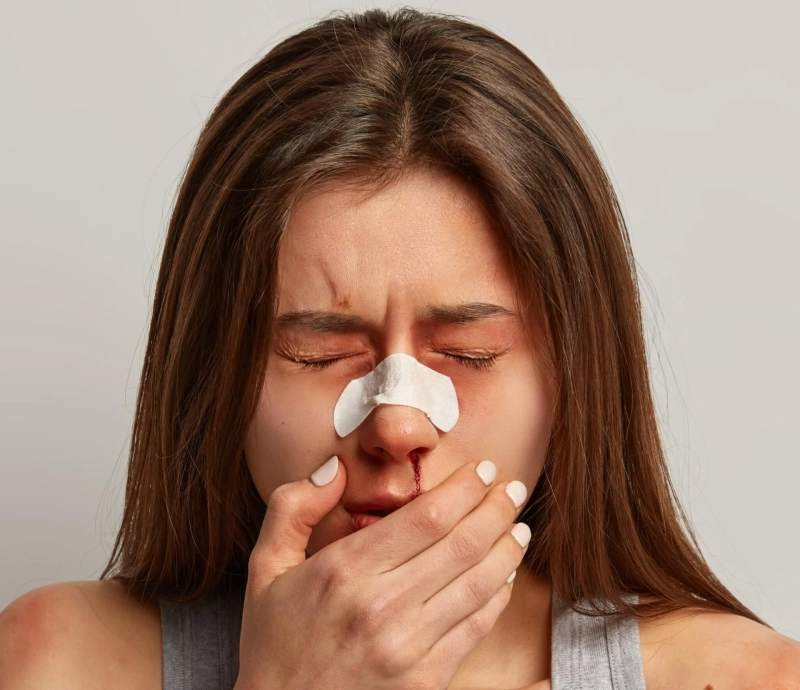Epistaxis, commonly known as a nosebleed, is a common medical condition that occurs when there is bleeding from the nose. It can happen to anyone but is more common in children and older adults. Nosebleeds can be alarming, but they are usually not serious and can be treated easily.
Types Of Nosebleed
Nosebleeds come in two types: anterior and posterior.
ANTERIOR NOSEBLEEDBlood from the anterior nosebleed emerges through the nasal aperture from the front of the nose. The posterior nasal hemorrhage is less frequent. The anterior region of the Lateral Nasal Wall and Little's area, a short area in front of the nasal septum, are the most prevalent for anterior nose bleeding. It is often minor and is manageable with local pressure, such as packing the anterior nose or pinching the nose. Most victims are youngsters and young people, and trauma/nose picking is its most frequent cause.
POSTERIOR NOSEBLEEDWhen the rear or deeper area of the nose bleeds, it causes a posterior nasal bleed, which causes blood to travel down the back of the throat.
Although less frequent, posterior nasal hemorrhage is more severe. It typically happens on its own. The majority of the patients are older than 40. Bleeding may be so severe that the patient needs postnasal packing and hospitalization. The patient swallows the blood, which is visible in the pharynx, and then vomits the coffee-colored fluid. It is challenging to pinpoint the bleeding location because it is primarily in the deeper nasal cavity. Hypertension and arterial osteosclerosis are the most frequent causes of posterior nasal bleeding.
Causes of Epistaxis
The nose is a sensitive organ and has a rich blood supply. Any damage to the blood vessels can cause a nosebleed. Here are some of the most common causes of epistaxis:
Dry air: Dry air can cause the lining of the nose to dry out and become irritated, leading to nosebleeds.Injury: Injury to the nose, such as a blow to the nose or picking the nose, can cause the blood vessels to rupture and lead to a nosebleed.Allergies: Allergic reactions to pollen, dust, or animal dander can cause the nose to become inflamed and lead to nosebleeds.High blood pressure: High blood pressure can cause the blood vessels in the nose to burst and lead to a nosebleed.Medications: Certain medications, such as blood thinners and aspirin, can increase the risk of nosebleeds.Infections: Infections, such as sinusitis or a cold, can cause the nose to become inflamed and lead to nosebleeds.Treatment for Epistaxis
In some cases, nosebleeds stop on their own without any medical intervention. However, medical attention is necessary if the nosebleed is severe or lasts more than 20 minutes. Here are some of the treatment options for epistaxis:
Pinching the nose: Pinching the nose can help stop the bleeding by applying pressure to the blood vessels.
Ice pack: Applying an ice pack to the nose can help constrict the blood vessels and stop the bleeding.
Nasal packing: If the bleeding is severe, a doctor may insert gauze or another material into the nose to help stop the bleeding.
Cauterization: In some cases, a doctor may use a special tool to cauterize the blood vessels in the nose to stop the bleeding.
Home Remedies:
Stay hydrated to prevent the nasal lining from drying out.Use a humidifier to add moisture to the air.Avoid picking your nose or blowing your nose forcefully.Apply petroleum jelly or saline nasal spray to moisturize the nasal passages.To promote clotting, consume foods rich in vitamin K, such as spinach and kale.It is important to seek medical attention if nosebleeds are frequent or last for an extended period of time.At The End
Everyone can experience a nosebleed because they are a common condition. Although they can be concerning, they are typically not dangerous and are easily managed with self-care techniques. Get medical help if you often or severely bleeding from the nose or if it continues after 20 minutes. You can lower your chance of getting nosebleeds by being proactive and exercising proper self-care.


